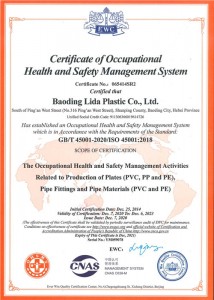Dec . 18, 2024 22:11 Back to list
cpvc chemical pipe
Understanding CPVC Chemical Pipes Properties, Applications, and Advantages
Chlorinated Polyvinyl Chloride (CPVC) is a thermoplastic material that has gained traction in various industries due to its excellent chemical resistance and high thermal stability. The versatility of CPVC makes it an ideal choice for piping systems that transport corrosive chemicals, hot water, and other demanding substances. This article delves into the properties, applications, and benefits of CPVC chemical pipes.
Properties of CPVC
CPVC is derived from PVC through a chlorination process, which enhances its molecular structure and, consequently, its properties. One of the most significant advantages of CPVC is its exceptional resistance to a variety of chemicals, including acids, alkalis, and salts. This characteristic makes it highly suitable for chemical processing and handling applications.
Additionally, CPVC pipes can withstand temperatures of up to 200°F (93°C), which is considerably higher than standard PVC pipes. This thermal stability ensures that CPVC is effective in high-temperature environments where other materials may fail. The pipe’s smooth internal surface also minimizes friction loss, leading to efficient flow and reduced energy costs.
Another property worth noting is the lightweight nature of CPVC. This characteristic not only facilitates easier handling and installation but also reduces the overall cost of transportation and labor. CPVC is non-conductive, which makes it a safe choice for various applications, as it does not corrode or cathodically react with other materials.
Applications of CPVC Chemical Pipes
The range of applications for CPVC chemical pipes is extensive. These pipes are predominantly used in industries such as
2. Water Treatment CPVC is commonly utilized in water treatment facilities for transporting hot and cold water, as well as for handling various chemicals used in the purification process.
3. Pharmaceuticals In the pharmaceutical industry, CPVC pipes are essential for the transport of chemicals and compounds because they prevent contamination and maintain the integrity of sensitive materials.
cpvc chemical pipe

4. Fire Sprinkler Systems CPVC is certified for use in residential and commercial fire sprinkler systems, taking advantage of its high-temperature resistance and lightweight design.
5. Irrigation Systems In agriculture, CPVC is used in irrigation systems for its resistance to chemicals often found in fertilizers and pesticides.
Advantages of CPVC Chemical Pipes
The use of CPVC chemical pipes comes with several advantages
- Durability CPVC pipes are designed to last for decades. Their resistance to corrosion and degradation means lower maintenance and replacement costs.
- Ease of Installation The lightweight nature of CPVC makes it easier to handle and install compared to heavier materials like metal, which can significantly reduce labor costs.
- Cost-Effectiveness Although the initial investment in CPVC may be slightly higher than traditional piping materials, the long lifespan and reduced maintenance translate to lower total costs over time.
- Safety CPVC does not support combustion and is non-toxic, offering a safer alternative for piping systems that handle hazardous materials.
- Versatile Connections CPVC pipes can be easily connected using solvents and fittings specifically designed for CPVC, making installation quick and efficient.
Conclusion
In conclusion, CPVC chemical pipes represent a superior choice for many industries dealing with corrosive substances, high temperatures, and strict safety regulations. Their unique properties, diverse applications, and numerous advantages make them an invaluable asset in modern piping systems. Whether in chemical processing, water treatment, or even fire protection systems, the reliability and efficiency of CPVC continue to make it a preferred material for engineers and businesses alike. With ongoing advancements in polymer science, the future for CPVC and its applications looks promising, ensuring its place in essential industrial processes for years to come.
-
Durable PP Rigid Sheet: Lightweight, Chemical Resistant Solutions
NewsAug.21,2025
-
PVC Grey Sheet for Extraction: Chemical Resistant & Durable
NewsAug.19,2025
-
Durable PVC Pipe Fittings for Plumbing & Irrigation Needs
NewsAug.18,2025
-
HDPE Steel Belt Reinforced Spiral Corrugated Pipe | High Strength
NewsAug.17,2025
-
HDPE Pipe Fittings: Durable, Leak-Proof Solutions
NewsAug.16,2025
-
Premium CPVC Sheet: High-Temp & Chemical Resistant Solutions
NewsAug.15,2025

